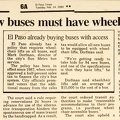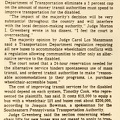[Headline] Wheelchair lifts required on all new transit buses
Denver Post Staff and Wire Reports
PHILADELPHIA -- Advocates for the disabled Tuesday hailed a federal court ruling requiring wheelchair lifts on new public buses, but a spokesman for transit agencies said the ruling doesn't address vexing problems.
"We've been grappling with this for a long time" said Albert Engelken, deputy executive director of the Washington-based American Public Transit Association.
He said wheelchair lifts receive limited use where they exist and are an added expense to transit agencies at a time when federal subsidies have been dwindling.
On Monday, a 3rd U.S. Circuit Court of Appeals panel ruled 2-1 that Congress has made its wishes on accessibility clear, and that lift-equipped buses are part of that mandate.
The court ordered the Transportation Department to rewrite a regulation allowing communities to offer alternative "paratransit” service, such as van rides, to the disabled. It said the 24-hour reservations that riders need to make for such services hinder spontaneous use of mass transit.
The ruling apparently will have no impact on the Regional Transportation District in Denver, which already has a handicapped accessibility policy that mirrors requirements outlined by the appellate court, an RTD official said.
RTD spokeswoman Diana Yee said 80 percent of the system’s 750-bus fleet is wheelchair lift-equipped. Additional service is supplied by a 16-vehicle paratransit program called Handi-Ride that uses vans and small buses to respond to individual transportation requests.
RTD also is requiring private operators; soon to takeover 20 percent of the system’s routes, to use buses equipped with wheelchair lifts.
James Fornari, a New York City attorney for a group of veterans with spinal-cord injuries, said the court ruling will force transit systems to look for the most efficient means of serving disabled people.
“We are quite pleased with this decision, and I see it as a springboard for making other transit systems, which have buses accessible to the mobility impaired, so they can be mainstreamed into American life and society," Fornari said.
Engelken said his association’s board, which comprises the heads of transit agencies. across the nation, believes agencies should be able to decide on a local basis how best to serve disabled people.
- Created on
- Friday 12 July 2013
- Posted on
- Wednesday 22 July 2015
- Tags
- 24 hour advanced reservation, 3rd US Circuit Court of Appeals, accessible, Albert Engelken, APTA, buses, court ruling, Denver, disabled veterans, Handi-Ride, James Fornari, local option, paratransit, Philadelphia, RTD, vans, wheelchair lifts
- Albums
- Visits
- 3389
- Rating score
- no rate
- Rate this photo


0 comments